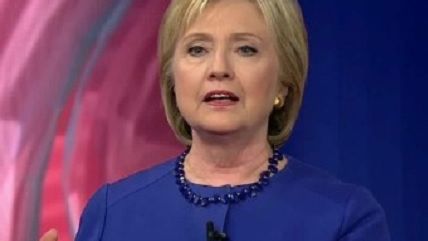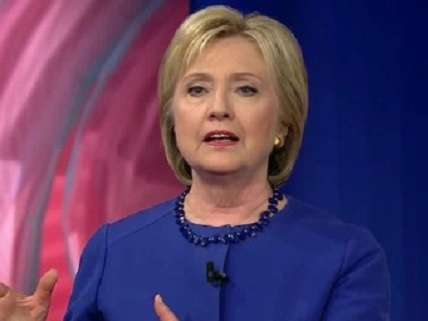Hillary Clinton Gives Long, Incomplete Answer on Police Reform
Mentioned Zachary Hammond, other cases, but not the role of unions and stupid laws in perpetuating police violence.


Asked about the backlash among police officers to Beyoncé's Super Bowl 50 performance, Hillary Clinton declined to engage the performance directly, instead talking about police reform in a way that identified a wide range of problems but also missed crucial solutions.
"I think there are an enormous number of police officers in our country that perform honorably every single day," Clinton said at last night's CNN town hall debate in South Carolina. "They put themselves in harm's way, they connect with the communities they are sworn to protect, and we should show them all the respect that they have earned and deserved."
Such deference to police officers—as if they were not public employees paid to perform a service but some kind of public servants for whom the only necessary payment is respect, and not, say, a paycheck, a pension, and protection from the consequences of their actions—make it harder to engage honestly about the police reforms needed.
Clinton moved on to acknowledge there "problems in our criminal justice system in a lot of places that we can't ignore."
She mentioned two prominent police shootings from South Carolina in 2015—that of Walter Scott and Zachary Hammond. While she mentioned Hammond was "unarmed and killed in a police action," she didn't mention why police targeted him in the first place—over a small amount of marijuana.
"We have lost too many young people," Clinton said. "So what's the answer?"
Clinton talked about training police officers to de-escalate, but it would be more effective, especially on the federal level, to consider how to de-escalate laws so that they don't put law enforcement officials and the people on whom the laws are imposed into situations where violence is more likely.
"I don't think the answer is for us to find ourselves in opposing camps, where we're just going to be looking at each other with mistrust," Clinton said, referring to the controversy over the Beyoncé performance.
Yet laws like the ones propping up the drug war create the most dangerous camps—police officers who are ordered to impose the will of lawmakers (and ultimately, in a democratic society, of voters) versus people engaged in non-violent, consensual behavior that the public disapproves of.
"We have to figure out how we're going to lift up the good practices, reform policing, provide more support, so that force is a last resort, not a first choice," Clinton said, "and that means helping to train police." It also needs to mean not asking police officers to go out and enforce the kind of petty laws that not only increase the likelihood of police violence but also trap many people in cycles of poverty.
Clinton then brought up the case of Dontre Hamilton, who was shot by a police officer in Milwaukee who was trying to remove Hamilton from a park bench after a number of officers who were previously called about Hamilton declined to do so.
"We've got to come to grips with the fact that we've got to do some retraining here," Clinton said, "We've got to do some work to make sure that our police are understanding how best to deal with situations, where somebody's not armed, somebody's sitting on a park bench, and he ends up dead, so there is work to be done."
Perish the thought that Clinton might've mentioned the independent review commission set up in Wisconsin to deal with police shootings just like Hamilton's, because Scott Walker was the governor when that law was passed. The commission, which ended up being stacked with former Milwaukee law enforcement officials, ended up ruling in favor of the officer, although the police department fired him for policy infractions related to the incident. Walker said he wasn't sure if the commission decided correctly, but did not want to get involved.
While Clinton framed the issue of police reform as one that still requires a lot of questions be asked to begin to arrive at solutions, that work is actually already being done. Activists associated with Black Lives Matter launched Campaign Zero last year, a set of policy initiatives aimed at reducing police violence. Clinton does not have to re-invent the wheel—she can work off the proposals of Campaign Zero.
Among their policy solutions is reforming police contracts to remove barriers to accountability put up via collective bargaining and other labor agreements.
"Let's hold police behavior accountable, so that there's an incentive for people to change how they are doing police practices," Clinton said.
Police unions are such a big part of the problem of incentives in policing that Black Lives Matter launched an initiative specifically to collect and analyze union contracts. It should be becoming increasingly clear that police unions are a major part of the problem of police violence. Clinton and other Democrats (and Republicans) should be held accountable for ignoring that, and other components, of the problem in favor of rhetorically pleasing bromides that won't lead on their own to meaningful reform.
"What we want to do is stop this from happening again," Clinton said. "We want to save lives."


Show Comments (60)